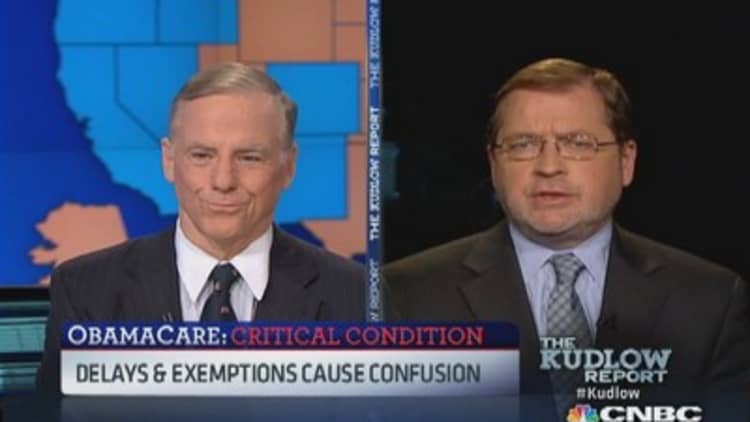Wealthy individuals aren't the only ones struggling to cope with higher income-tax rates and the new 3.8 percent investment income tax funding the president's health-care plan. The beneficiaries of trusts—wealthy or not—are also feeling the bite, and estate planners are trying to figure out ways to reduce it.
Trusts are separate legal entities created by a person or organization and managed by a trustee for the benefit of others—very often spouses or children of the trust creator. They allow a person to remove assets and property from their own estates, thereby avoiding the estate tax when they die, and enable them to control how and when assets are distributed to their beneficiaries.
The bigger tax hit
The variety of trusts and the rules that govern them are enormous. So-called simple trusts pay out all the income they produce to beneficiaries, who then don't face income taxes. With grantor trusts, the creator of the entity is deemed the owner and thus faces all tax liabilities stemming from its administration. However, for the rest of the universe of trusts—call them complex, nongrantor trusts—income taxes have become a much bigger deal.
The reason is that, for tax purposes, trusts are treated like wealthy individuals—only worse. While the new 39.6 percent marginal tax rate created by the American Taxpayer Relief Act applied to income over $400,000 for individuals last year, it kicked in at an income threshold of just $11,950 for trusts. The 3.8 percent Medicare surtax applied to the net investment income of individuals earning more than $200,000 also hit trusts starting at that lower threshold.
(Read more: Spoiled for investment choices? Less is much more)
The upshot is significantly higher tax bills. Assuming no capital gains income, a trust holding $1 million in assets and making a 10 percent return last year paid income taxes of $34,868 and new Medicare taxes of $3,346. That's nearly $7,400 more than it would have paid in 2012 on the same income.
While minimizing taxes is certainly not the only, nor even the primary, objective of trusts, it is a major issue for trustees with a fiduciary responsibility.
"The objective is to maximize the amount of money that family members [or other beneficiaries] receive," said Ronni Davidowitz, head of the trusts and estates practice at legal firm Katten Muchin Rosenman. "Estate planners have to revisit some of their planning patterns of the past and reevaluate what makes sense now."

Dealing with the tax hit
One strategy to reduce the tax hit is to invest more of the trust's assets in tax-exempt securities, such as municipal bonds.
"The new investment income taxes have caused some clients to think about whether they can handle higher allocations to municipal bonds," said Lisa Whitcomb, director of wealth strategies at Glenmede, a privately owned trust company managing more than $25 billion in assets. However, the still-low yields on muni bonds—and the fact that tax-reform proposals from both political parties have proposed taxing muni bond interest—have made people wary, she added.
(Read more: Long/short strategies for a souped-up market)
A more difficult decision is whether a trustee should consider making larger distributions to beneficiaries. If those beneficiaries are in a lower tax bracket and not subject to the new Obamacare taxes, the distribution can save a lot of money. "If it's in the discretion of a trustee to distribute assets, the additional level of tax is an aspect of what you have to look at," said Davidowitz.
It's still only one aspect, however. A bigger distribution may not be permissible under the trust's governing documents, and it may not make sense based on the circumstances of the beneficiaries. If their beneficiaries are minors or deemed not responsible enough to handle larger sums of money, trustees are likely wary of making the distributions, despite potentially positive tax consequences.
"Saving taxes is not the be-all and end-all of managing trusts," said Laura Twomey, a partner with law firm Simpson Thacher & Bartlett who specializes in estate planning. "There are a lot of non-tax issues involved in distributions to beneficiaries, and you have to be aware of the intentions of the creator of the trust."
(Read more: Are bonds still a safe bet? It depends)
Nevertheless, bigger distributions can make sense in some situations, said Whitcomb. According to her, while only two or three of the hundreds of trusts that Glenmede manages elected to make additional distributions for the 2013 tax year—the deadline for making them was March 5—it's the right thing to do in some cases, she said.
"Many trusts created years ago are in their third or fourth generation of beneficiaries, and those beneficiaries may be competent, normal adults who are not among the high-net-worth individuals who created the trust," said Whitcomb. "A bigger distribution might be a real boon for them."
With higher income taxes likely an ongoing issue, trustees may want to consider the option more closely.
—Andrew Osterland, Special to CNBC.com.




